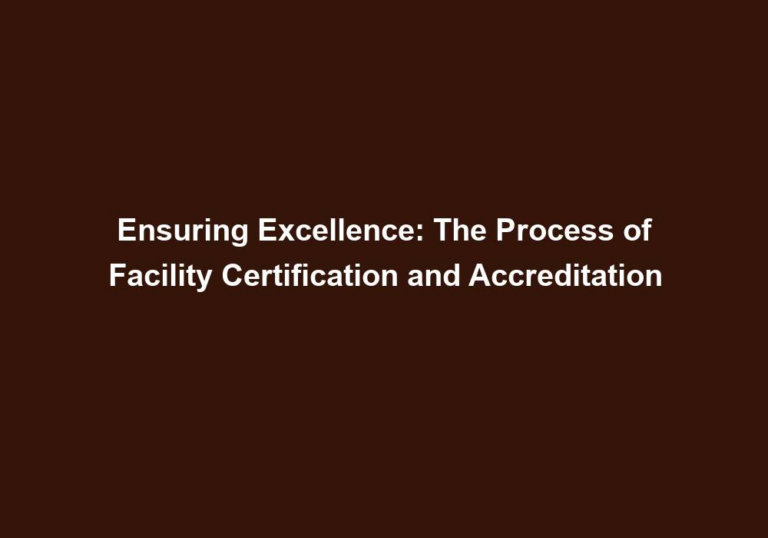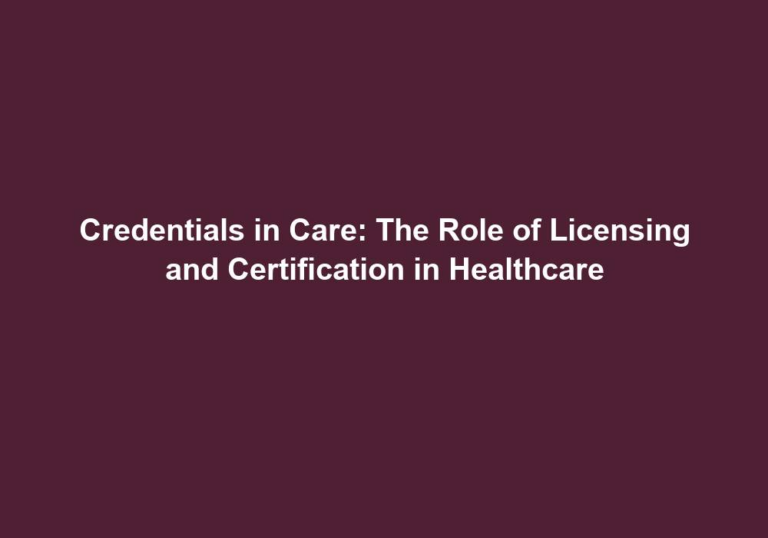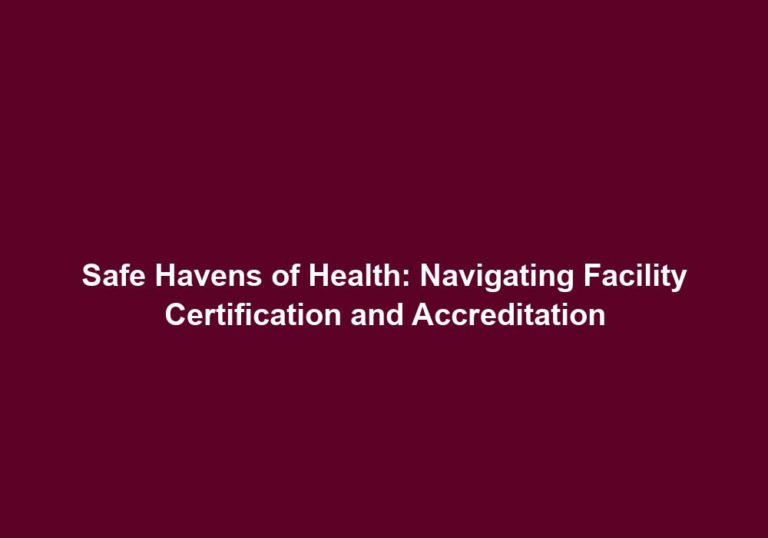Upholding Care Standards: The Role of Facility Certification and Accreditation in Healthcare
In today’s ever-evolving healthcare landscape, ensuring a high standard of care is of paramount importance. Healthcare facilities around the world strive to provide the best possible care to their patients, and one way to achieve this is through facility certification and accreditation. These processes play a vital role in upholding care standards and ensuring patient safety.
What is Facility Certification?
Facility certification is a formal recognition given to a healthcare facility that meets specific predetermined standards. It serves as proof that the facility has met all the necessary requirements to provide quality care and is capable of delivering services that meet the highest standards.
Certification is typically awarded by an independent third-party organization that specializes in evaluating healthcare facilities. These organizations have a set of established standards that must be met in order to receive certification. These standards often cover areas such as patient safety, clinical practices, infection control, risk management, and quality improvement.
Importance of Facility Certification
Facility certification holds significant importance in the healthcare industry. It provides reassurance to patients and their families that the facility they are seeking care from has undergone a rigorous evaluation process and has met the necessary standards for quality care. Some key benefits of facility certification include:
-
Ensuring Patient Safety: Certification programs focus on patient safety, ensuring that healthcare facilities have implemented measures to prevent medical errors, reduce infection rates, and promote patient well-being. This includes implementing protocols for hand hygiene, sterilization of medical equipment, and proper medication management.
-
Improving Quality of Care: The certification process encourages healthcare facilities to continually improve their practices and strive for excellence. It helps identify areas for improvement, promotes evidence-based practices, and fosters a culture of continuous learning. By adhering to the standards set by the certification organization, facilities can enhance the overall quality of care provided to patients.
-
Enhancing Trust and Credibility: Certified healthcare facilities gain a competitive edge by demonstrating their commitment to quality care. This enhances their reputation, instills trust among patients, and attracts more healthcare professionals. Patients are more likely to choose a certified facility as they perceive it as a mark of reliability and competence.
-
Meeting Regulatory Requirements: Facility certification often aligns with regulatory requirements, ensuring that healthcare facilities comply with local and national regulations. This helps facilities avoid legal issues and penalties. By staying up to date with regulations, healthcare facilities can ensure they are providing care that meets the necessary standards.
-
Facilitating Insurance Coverage: Some insurance providers may prefer or require healthcare facilities to have certification to provide coverage. Certification can facilitate smoother interactions with insurance companies and improve reimbursement rates. This is because insurance providers view certified facilities as more reliable and trustworthy, leading to better coverage terms and rates.
What is Facility Accreditation?
Facility accreditation goes hand in hand with certification. While certification focuses on meeting specific standards, accreditation is a comprehensive evaluation of the entire healthcare facility’s operations and services. Accreditation is typically a voluntary process, and it involves a thorough assessment of various aspects of the facility, including governance, leadership, patient care, and quality improvement.
Accreditation is often awarded by an independent accrediting body, such as The Joint Commission (TJC) or the Healthcare Facilities Accreditation Program (HFAP). These bodies have stringent criteria that healthcare facilities must meet to receive accreditation.
The Role of Facility Accreditation in Healthcare
Facility accreditation plays a crucial role in maintaining and improving the quality of healthcare services. Some key aspects of accreditation include:
-
Evaluation of Quality and Safety: Accreditation involves an in-depth evaluation of a healthcare facility’s policies, procedures, and practices to ensure they meet or exceed industry standards. This evaluation focuses on patient safety, infection control, medication management, and overall quality improvement. By undergoing accreditation, healthcare facilities can identify areas where they can enhance the quality and safety of care provided to patients.
-
Continuous Quality Improvement: Accreditation encourages healthcare facilities to continuously assess and improve their practices. It provides a framework for ongoing quality improvement initiatives and helps identify areas for enhancement. Through accreditation, facilities can implement evidence-based practices and stay updated with the latest advancements in healthcare delivery.
-
Promoting Best Practices: Accreditation bodies often establish best practices and evidence-based guidelines that healthcare facilities should follow. By adhering to these standards, facilities can optimize their operations and ensure the delivery of high-quality care. This includes implementing standardized protocols for patient care, infection prevention, and emergency response.
-
Enhancing Patient Satisfaction: Accreditation demonstrates a healthcare facility’s commitment to providing the best possible care. This assurance can positively impact patient satisfaction and contribute to improved patient outcomes. Patients feel more confident in choosing an accredited facility as they perceive it as a mark of quality and professionalism.
-
Strengthening Collaboration and Communication: Accreditation requires effective collaboration and communication among healthcare professionals. This fosters a multidisciplinary approach to care delivery, leading to better coordination and improved patient experiences. By promoting teamwork and communication, accreditation helps create a culture of collaboration that enhances the overall quality of care.
Conclusion
Facility certification and accreditation play vital roles in upholding care standards and ensuring patient safety in healthcare facilities. Certification recognizes facilities that meet specific predetermined standards, while accreditation evaluates the overall operations and services of a facility. These processes promote continuous quality improvement, enhance patient satisfaction, and instill trust and credibility among patients and healthcare professionals.
By actively seeking facility certification and accreditation, healthcare facilities can demonstrate their commitment to excellence and provide assurance that they are delivering the highest standard of care. Patients can have peace of mind knowing that they are receiving care from facilities that prioritize their safety and well-being.






